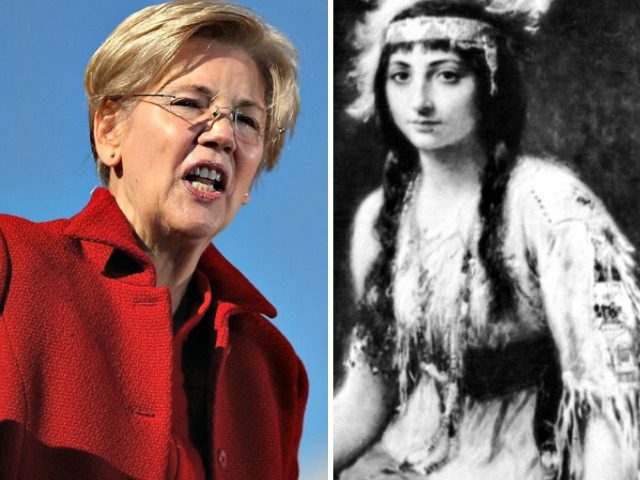Sen. Elizabeth Warren (D-MA) addressed reporters outside her home following the launch of the progressive firebrand’s 2020 presidential exploratory committee Monday, refusing to comment on the controversy regarding the results of a DNA test showing she possesses distant Native American ancestry.
“You know — look — I have put it all out there,” Warren began. “It’s there for anyone to see, but at the end of the day, this is going to be about this election going forward, is going to be about the tens of millions of families across this country who work hard, who play to the rule, and who just time after time, take one body blow after another.”.
Pressed on how serious she is about a potential presidential bid, Warren affirmed that she is “in this fight all the way” and aims to “build a grassroots campaign.” She said:
I never thought I would run for anything, ever, in my life, but America’s middle class is getting hollowed out, and opportunity for too many of our young people is shrinking. So, I’m in this fight all the way. … I’m going to build a grassroots campaign. It’s already got people from all across this country who are going to be part of it, and together, we’re going to make change. And if people out there see it and want to be part of it, I hope they go to elizabethwarren.com and join us. Because this is how we’re going to build the movement that will change America.
Earlier Monday, Warren took the first major step toward launching a widely anticipated campaign for the presidency, hoping her reputation as a populist fighter can help her navigate a Democratic field that could include nearly two dozen candidates.
“No matter what our differences, most of us want the same thing,” the 69-year-old Massachusetts Democrat said in a video that highlights her family’s history in Oklahoma. “To be able to work hard, play by the same set of rules and take care of the people we love. That’s what I’m fighting for and that’s why today I’m launching an exploratory committee for president.”
Warren enters a Democratic field that is shaping up as the most crowded in decades, with many of her Senate colleagues openly weighing their own campaigns, as well as governors, mayors, and other prominent citizens. One of her most significant competitors could be Sen. Bernie Sanders (I-VT), who is eyeing another presidential run harnessing the same populist rhetoric.
She must also move past a widely panned October release of a DNA test meant to bolster her claim to Native American heritage. The move was intended to rebut President Donald Trump’s taunts of Warren as “Pocahontas.” Instead, her use of a genetic test to prove ethnicity spurred controversy that seemed to blunt any argument she sought to make.
The DNA analysis was done by Stanford University professor Carlos D. Bustamante, a prominent expert in the field. He concluded that the great majority of Warren’s ancestry is European but added that the results “strongly support” the existence of a Native American ancestor. In his report, Bustamante said he analyzed Warren’s sample without knowing the identity of the donor. He concluded that Warren has a pure Native American ancestor who probably lived six to ten generations ago, and that it was impossible to determine the individual’s tribal connection.
If Warren’s ancestor were six generations removed, she would be 1/64th Native American. But if her ancestor had been as much as ten generations removed, that would make the individual a great-great-great-great-great-great-great-great grandparent and render Warren only 1/1,024th Native American, according to Blaine Bettinger, a genealogist, and author who specializes in DNA evidence.
Warren has previously stated that she changed her mind recently and took a DNA test proving her heritage because Americans’ trust in government is “at an all-time low” and she wanted to help rebuild it by being transparent.
Following the result’s release, a Cherokee Nation official criticized Warren, accusing her of “undermining tribal interests with her continued claims of tribal heritage.” Cherokee Nation Secretary of State Chuck Hoskin Jr. stated DNA tests are useless to determine tribal citizenship and don’t distinguish whether a person’s ancestors were indigenous to North or South America.
Further, Hoskin Jr. argued, “using a DNA test to lay claim to any connection to the Cherokee Nation or any tribal nation, even vaguely, is inappropriate and wrong.”
The Massachusetts Democrat, who said she was told her mother was “part Cherokee and part Delaware,” acknowledged that DNA and family history have nothing to do with tribal affiliation or citizenship, which is determined by tribal nations.
The Associated Press contributed to this report.

COMMENTS
Please let us know if you're having issues with commenting.